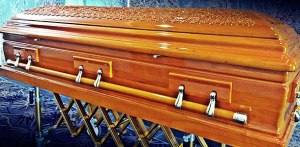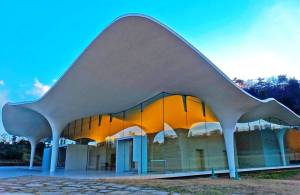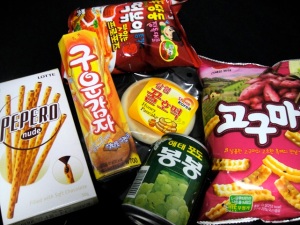by Third Bass
It was a Sunday night. I was at the sink, working my way through a mountain of dishes, when my meditative scrubbing was interrupted by one of the blings, pings, and dings that increasingly rule our lives and eviscerate our attention spans. It was a message from a coworker: “Jethro’s been taken to the hospital, I don’t think he made it.”
I stood there clutching the phone and blinking, running my eyes over that chilling insubordinate clause again and again: I don’t think he made it. What the fuck? Jethro–the dude I was bullshitting with just two days ago–didn’t make it? He checked out for good, just like that?
* * *
Jethro sat across from me in an office for the last two years, and over that time we managed to forge a fairly close bond, sealed in our mutual recognition of the absurdity that pervades our existence here. His life story was not your typical foreigner-doing-the-EFL-thing-in-Korea. As a black man in his mid-fifties, he had grown up in Alabama in the immediate aftermath of the Civil Rights era. He studied music at Yale and went on to receive a PhD in bassoon performance from the University of Michigan. His stories of the weird jobs he worked over the years to stay afloat in the unforgiving world of professional orchestral musicians offered as good an explanation as any for how he ended up teaching English at a Korean university. We all arrive via different paths. I never asked him point blank.
Jethro’s passing got me thinking about the nature of our lives, and heaven forbid, dying here. For the person that dies, death is ultimately uncomplicated; for the friends and family that remain, dying abroad opens up a host of delicate issues. My bosses and coworkers were forced to take on the full weight of settling the man’s affairs. At first I stood on the sidelines, offering just moral support, though it didn’t take too long before I got involved, leading me to one of the stranger experiences during my time here.
* * *
The funeral took place on Friday, and most of the foreign faculty attended. We came to pay our respects and try our best to stand in for Jethro’s family and closest friends, who were unable to make it. It struck me that while Jethro was usually jovial and engaging at work, he was a fairly private person, and I’m quite sure that no one in attendance could be counted among his dearest friends. But there we were: the best that was possible given the circumstances – a funeral B Team, if you will. One of our coworkers happens to be a preacher on the side, so he performed a little service and delivered the eulogy. Others said a few commemorative words, and that was that.
I was making my way to the exit when my boss approached and quietly asked if I “had some time.” In that distinct Korean way – that is, with little further explanation – I was handed a pair of white gloves, a framed picture of Jethro, and ushered into a waiting ambulance. The driver gruffly instructed me to don the gloves and hold the picture just so, and we were off.
Having lived in Korea over five years and being married into a Korean family, there is almost nothing that will really jolt me about this place. However, as I rolled out onto the highway in an ambulance driven by a total stranger, transporting a coffin containing my buddy who had been alive and well less than a week ago, holding a picture of him with my white-gloved hands, not entirely sure what we were even doing, I thought, Ok, this is fucking weird.
Things got even weirder when I figured out that we were headed to the crematorium. After a nearly one hour trip into the hinterlands and a drive up a mountain, we came upon a massive, sparkling new building. The driver pulled up to the front and grunted for me to get out. Holding the picture, I walked inside with my two bosses and another coworker. We entered a glistening, stark, white room with vaulted ceilings. The place had an almost celestial feel. The coffin was rolled in and we gathered around. We were told to say our final goodbyes, which we did, and it was then carted through an oversized set of double doors (both operational) that seemed to symbolize the final crossing over to the other side.
We were taken to the bureaucratic wing of the crematorium where my boss filled out the necessary paperwork, and then to another unsettlingly clean room that had rows of individual booths. We were directed to go to booth #10, which consisted of a bench surrounded by a partition. Here we sat and looked through a window as Jethro’s coffin rumbled down a conveyor belt towards the incinerator. We watched as he disappeared behind a set of mechanical shutters, where he was made flesh and bones no more.
* * *
Next came the waiting period, where they lead us to our own private room and said that it would be about two or three hours. I was pleased to learn that the ordeal of having your deceased friend or relative torched into oblivion poses no obstacle to getting a proper lunch. We were in Korea, after all. So we chowed down on seogogi gukbap, rice, and refillable banchan (side dishes) in the crematorium cafeteria. There was also a convenience store, of course, where we were able to procure Jethro’s urn, along with some cookies and crackers, before retiring to our designated waiting room.
After filling an awkward two hours with small talk and snacks, the video board in our room listed Jethro as completed and ready for collection. We trekked downstairs and arrived at another partitioned bench with a viewing window The conveyor belt rolled towards us this time, delivering a giant pile of ashes—the remnants of my friend who seemed aces last week. Two men came out in what looked like radiation suits and meticulously swept the ashes into our convenience store urn before sliding it over to us.
Charged with carrying the ashes, I walked deliberately through the lobby to the car, still a bit dazed at seeing Jethro reduced to a heap of smoldering dust. As it turns out, his father had requested that Jethro’s ashes be scattered into the East Sea. My boss planned to do this near Pohang and would not need my help. I was dropped at the train station and left to reflect upon the fickleness of life.
That it was me, a buddy from work, who ended up handling these most intimate affairs strikes me as a bit absurd. I like to think that Jethro too would count this as just one more of many absurdities of life that originally brought us together. Cheers, brotherman. I hope the tides take you wherever you wanted to go.





Recent comments